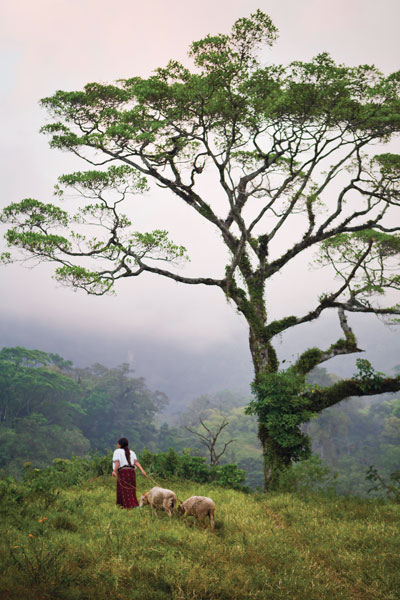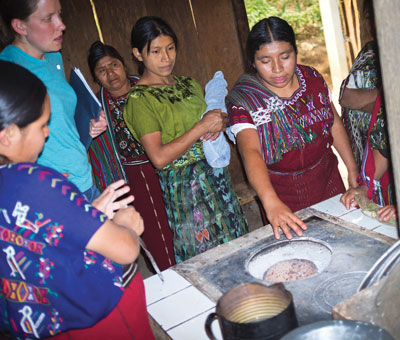"They Are Great!"

Working for the future, Elena Bernal tests a new fuel-efficient cook stove in her home in the highlands of Guatemala. While she and other women work to improve life in their communities, their efforts also protect the environment to benefit our world.
“Estàn muy bien! (They are great!)” Over the phone, Elena Bernal greeted me warmly from Guatemala and then spoke these three simple words.
They were music to my ears.
Elena’s voice took me back to 2007, when my wife Becky and I first traveled to Union Victoria, Guatemala, where Elena lives. I remembered riding in a pickup truck winding its way up the dirt road into her community. I recalled the steep mountains on every side, the cool mountain air, the smiling children walking their sheep to the stream, the smoke billowing from little chimneys jutting from the metal roofs of tiny huts, and the smell of tortillas cooking.

When Becky and I first arrived, we thought we were going there to help them. What actually took place surprised even us.
Union Victoria is home to about 500 Ixil (EE-sheel) and Quichè (Kee-CHAY) Mayan people. After more than fifteen years on the run from the Guatemalan Army and its “scorched earth” policy, in 2001 they were resettled from their mountain hiding places to a dilapidated coffee plantation.
I remember the trees—in every direction there were trees. Trees meant a lot to the people of Union Victoria. They pruned trees to provide the perfect shade for the coffee harvest. They composted the leaves. They milled lumber on the mountainside and carried it down the mountain piece by piece to build houses, schools, fence posts and furniture. And, trees provided a sustainable fuel for cooking traditional meals of beans and tortillas or boxbol (BOKSH-bol), a dish of boiled squash leaves and cornmeal.
The people wasted nothing, and did everything with a deep sense of respect and gratitude.

This little community’s reliance on trees is a special—and fragile— balance, which needs to be preserved. So, several years ago, families started building fuel-efficient cooking stoves with help from Tom Benevento, a Trees for Life volunteer.
The new stoves replaced the open fires traditionally used for cooking. Their greater efficiency dramatically reduced the number of trees being cut down for fuel.

A heavy burden is carried by Guatemalan villagers, who have to journey on steep paths each day to cut firewood and carry it home on their backs.
They provided a cleaner, safer and smoke-free indoor environment for the women and children working in the kitchen. And, in their tiny huts with dirt floors and walls made of rough wooden planks, these simple stoves provided a special gathering place for the family.
In the ten years since the introduction of these stoves, there have been some important innovations to the design to improve both efficiency and durability. So, with funding and support from Trees for Life, I recently returned to Union Victoria to introduce the new design. We demonstrated the changes to the local Women’s Committee (Junta Directiva de Mujeres) by modifying two existing stoves and building a new stove with an improved combustion chamber.
Women leaders in the local Women’s Committee learn about the construction of a new fuel-efficient cook stove (the above two photos) and then examine the completed model (below). The improved stove requires less wood, while protecting women and children’s health by taking smoke out of the home and preventing the burns common with open fires.
Elena, the young woman who had just called me, is secretary of the committee. Watching her interact with the others, I was once again impressed and touched by how, at 20 years old, she demonstrated both a deep respect for the older generations and a tireless enthusiasm for serving her community. The women decided to test the stoves for a time before making a decision.
When we were finished, I returned home and waited to hear how these new stoves worked for them.
Now Elena was calling me: “Estàn muy bien! (They are great!)” Her excitement nearly leapt through the phone.
Her words brought back a flood of memories of the people of Union Victoria. I thought of their incredible resilience in the face of adversities. I thought of the beautiful spirit I experienced among them, their light-heartedness and creativity, and the great simplicity and integrity of their way of life.
We thought we had gone there to help them. But these long-forgotten people in a remote part of our world knew better. Quietly, through actions rather than words, they had helped to make us “whole” so that we could better understand our place in
this universe.
All I could do to express my gratitude was to merely repeat, “Estàn muy bien, Elena!”







